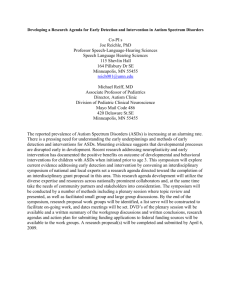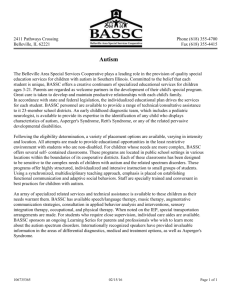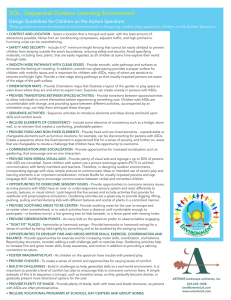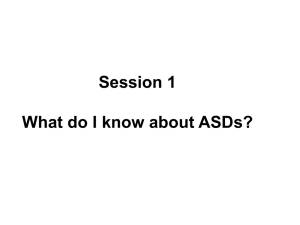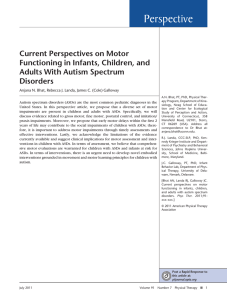Supporting students with asds in higher & further education
advertisement
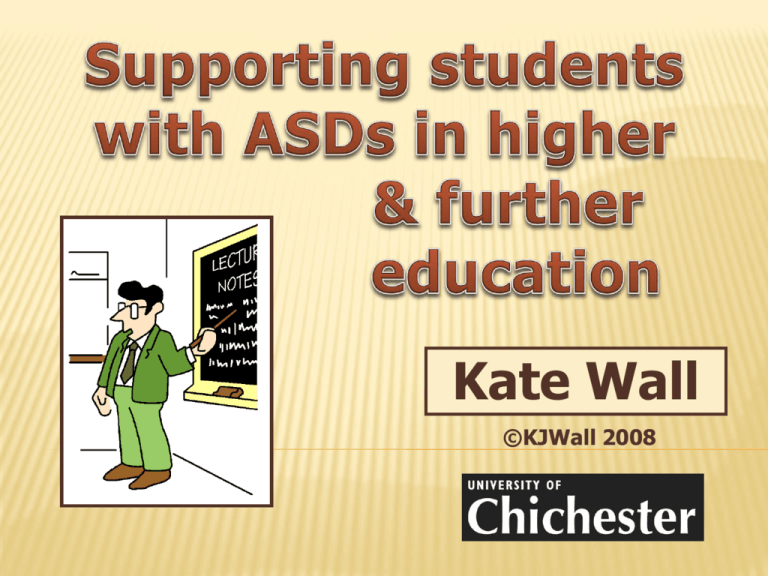
Kate Wall ©KJWall 2008 SESSION OUTLINE Introductions Setting the scene - some facts Education & college/university life Issues and challenges for students Academic study What do we offer? What we could do Summary 2 ©KJWall 2008 Setting the scene – Some facts… For those adolescents and adults with ASDs, life can be complex and confusing. Within the education, health and care sectors all staff should have a thorough awareness of features of ASDs and appropriate methods of support in order to further the lives of those with whom they work. (Wall, 2007: 10/11) Autism, as with many other conditions and disorders, is individual and manifests itself in different ways in different people, (Wall, 2007: 13) 3 ©KJWall 2008 At all life stages, individuals with ASD will struggle to comprehend what is expected of them in social situations – whether at school, in peer relationships or in the workplace. Autism has not cure, and the vast majority of people with ASD will continue to struggle with social interaction throughout their lives. (NAS, 2004: 1) Disabled people remain more likely to live in poverty, to have fewer educational qualifications, to be out of work and experience prejudice and abuse. They still routinely find themselves experiencing poorer services. (www.cabinetoffice.gov.uk) 4 ©KJWall 2008 IGNORED OR INELIGIBLE? People with autism or Asperger syndrome are amongst the most vulnerable and socially excluded in our society. Very few have jobs, live in their own homes or have choice over who cares for them. This needs to change. People with autism or Aspergers syndrome must no longer be marginalised or excluded. The National Autistic Society carried out research amongst the parents of 1200 adults… (Barnard et al, 2001: 6) 5 ©KJWall 2008 70% of parents felt their son/daughter would be unable to live independently and less than 10% can manage the most basic household tasks such as shopping, preparing meals… Only 12% of higher functioning adults are in fulltime paid employment. 65% of parents said their sons and daughters had difficulty making friends and 72% said their son/daughter had behaviours which other people find unusual or anti-social. 32% of parents reported that their son/ daughter had experienced mental ill-health. 56% had suffered with depression, a further 11% a nervous breakdown and 8% felt suicidal or had attempted suicide. (Barnard et al., 2001: 6-7) 6 ©KJWall 2008 IMPROVING THE LIFE CHANCES OF DISABLED PEOPLE This report sets out an ambitious vision for improving the life chances of disabled people so that by 2025 disabled people have full opportunities and choices to improve their quality of life and will be respected and included as equal members of society. (Cabinet Office, 2005: 6) 7 ©KJWall 2008 EDUCATION… Has a powerful part to play in this ambitious drive forwards – for disabled people and including those with ASDs Should be an enabling, facilitating experience enabling individuals to achieve their full potential A lack of professional understanding and contradictory or confusing guidance from central government mean that support services for children and adults with disabilities continue to be designed without autism in mind. (Broach et al, 2003: 1) 8 ©KJWall 2008 COLLEGE/UNIVERSITY LIFE Away from home Academic study Great social life! 9 Make new friends Step towards career Exciting range of activities ©KJWall 2008 DIFFICULTIES FOR STUDENTS WITH AUTISM Social interaction Social communication Imagination THE TRIAD OF IMPAIRMENTS 10 ©KJWall 2008 SOCIAL INTERACTION SOME EXAMPLES Avoids eye contact/uses peripheral vision Lacks desire to interact with others May appear oblivious to the world around Not interested in social or physical contact with others Lack of cooperation within leisure/play Lack of desire to establish friendships Unable to interpret or understand feelings and/or emotions May overreact to touch or closeness 11 ©KJWall 2008 SOCIAL COMMUNICATION Lack or limitations of useful/appropriate language. Lack of desire to communicate with others Echolalia Inability to comprehend gestures and/or facial expression Inability to understand the rules of communication May talk about one topic incessantly and at inappropriate times May not be able to transfer useful communication skills across contexts 12 ©KJWall 2008 INTERACTION Activities and routines may be rigid, stereotypical and repetitive. Resistance to imaginative/role play situations Limited or lack of ability to understand concepts outside of the concrete Repetitive and/or obsessive behaviours Difficulties coping with change 13 ©KJWall 2008 COLLEGE/UNIVERSITY LIFE Away from home Academic study Great social life! Make new friends 14 Step towards career Exciting range of activities ©KJWall 2008 Academic study 15 Problems in lecture hall/classroom Problems working in small groups Changing rooms – lack of corridor space Inconsistent timetables – room changes and no daily consistency Problems organising self Problems planning workload Problems understanding another educational perspective Problems understanding and accepting tutor feedback Impact of friendship/social problems ©KJWall 2008 Any of these may result in… Confusion Withdrawal Aggression Inappropriate or unusual behaviours Bullying and/or intimidation Self-harming or other self-injurious behaviours Depression Erratic sleep patterns and many more……….. 16 ©KJWall 2008 SO WHAT DO WE OFFER? I would argue that appropriate and effective support for adults with ASDs at FE and HE levels is a postcode lottery and will depend heavily on the commitment of all members of teaching staff. It is easy to say that a college or university welcomes diversity and demonstrates commitment to the inclusion of those with disabilities - it is a far greater demand to deliver it! Autism specific support is not the same as generic disability support. All this must change! 17 ©KJWall 2008 Example… Examples of statements from university website: The university places great emphasis on creating a friendly and supportive environment We have excellent facilities for learning The university is committed to providing facilities and services to meet the requirements of students with a variety of additional needs. …we celebrate diversity and truly believe in equality for all The university has fully considered the needs of a wide range of students and to have set up the management and resources needed to meet these needs 18 ©KJWall 2008 A TYPICAL DISABILITY AND ACADEMIC SKILLS SERVICE Sensory Advisor Dyslexia Advisor Mental Health Advisor Academic skills advisors Disability and Academic Services Coordinator 19 ©KJWall 2008 INSTITUTION Policies and procedures Commitment Training 20 ©KJWall 2008 There are real opportunities for us all to make a difference. Let’s grab the opportunity and make it happen. It is the students’ right and our responsibility. 21 ©KJWall 2008 REFERENCES & FURTHER READING Barnard, J., Harvey, V., Potter, D. and Prior, A. (2001) Ignored or ineligible? The reality for adults with ASDs. London: NAS Beakey, C. (2006) The Autistic Spectrum and Further Education: A Guide to Good Practice. London: Jessica Kingsley Broach, S., Camgöz, Ş., Heather, C., Owen, G., Potter, D. and Prior, A. (2003) Autism: Rights in Reality. London: NAS Cabinet Office. (2005) Improving the Life Chances of Disabled People. www.cabinetoffice.gov.uk/strategy/downloads/ workareas/disability/disabilityreport/pdf/disability.pdf (Accessed 05.11.06) Harpur, J., Lawlor, M. and Fitzgerald, M. (2004) Succeeding in College with Asperger Syndrome: A Student Guide. London: Jessica Kingsley 22 ©KJWall 2008 CONTINUED… Loynes, F. (2001a) The Impact of Autism: A report Compiled by the All Party Parliamentary Group on Autism. London: APPGA. Loynes, F. (2001b) The Rising Challenge: A Survey of Local Authorities on Educational Provision for Pupils with Autistic Spectrum Disorders. London: APPGA. NAS (2004) A Place in Society. London: NAS Wall, K. (2007) Education and Care for Adolescents and Adults with Autism: A guide for professionals and carers. London: Sage. Willey, L. H. (ed) (2003) Asperger Syndrome in Adolescence. Living with the Ups, Downs and Things in Between. London Jessica Kingsley 23 ©KJWall 2008



